Exposing Fake Karmapa Accounts
Updated on June 15, 2025
In Wu Hang Yee’s allegations concerning her purported relationship with the Karmapa, communication records via Line and Skype played a central role. She built a series of narratives around these platforms, claiming that the conversations served as key evidence of her alleged involvement with the Karmapa. Wu identified several accounts—specifically, three Skype accounts and one Line account—which she asserted belonged to him. Along with Vikki Han and Jane Huang, Wu used these accounts to support their claims of having communicated with the Karmapa.
1. Authentic or Fake? Karmapa’s LINE Accounts
- The Karmapa’s Line Account
In early January 2019, Taiwan’s Mirror Media reported on Jane Huang’s allegations against the Karmapa. Shortly afterward, on January 22, 2019, the Karmapa’s Chinese translator, Venerable Miaorong, immediately contacted him via Line to ask how they should refer to this “Ms. H” in public statements.
The Karmapa replied:
“I think we shouldn’t issue an official response — that would only help them.
She has a mental illness and needs medication. All the women she mentioned have no connection to me; it’s all in her imagination. Better not to mention her name casually — if someone confronts her, it could get ugly. Just say her surname is ‘Huang’. That way, she feels reassured, and I’m fine. Times have changed; let’s learn from celebrities!”
(Source: Jane Huang vs. Lodro Rinchen, Second Trial Judgment, Section IV(2), middle portion)
Venerable Miaorong was in contact with the Karmapa via Line, and his Line display name was in Chinese: 「第一宝藏」(First Treasure). This conversation later became part of the evidence submitted by Lodro Rinchen in the defamation lawsuit brought by Jane Huang. As a result, the “第一宝藏” Line account was officially recognized during the court proceedings.
· Contradiction Between Account Names and Writing Style
Wu Hang Yee seems to have a particular fondness for the word “scum” (渣). In her memoir, the term “scumbag” (渣男) appears countless times. Coincidentally, the Line and Skype account names she claims belonged to the Karmapa also contain the word “渣.”
Wu Hang Yee claims to be a disciple of the Karmapa, yet she provided highly questionable messaging accounts. The Line and Skype conversations she attributed to the Karmapa came from users with account names in Thai and Bengali: “กาก” (meaning “scum” in Thai) and “চাদ” (a Bengali transliteration also implying “scum”). These scripts bear a slight visual resemblance to Tibetan, which could mislead those unfamiliar with the Tibetan language. However, they are entirely unrelated. This choice of naming appears to be a deliberate attempt to create confusion and falsely present these accounts as originating from the Tibetan Buddhist community.
The Names of the Two Accounts
LINE Account Name: [กาก]
A Dharma friend and language researcher, Mr. Chen, conducted a detailed analysis of the so-called Karmapa accounts shared by Wu Hang-Yee. He pointed out that the account name in question appears problematic: it is written in a Thai script, not Tibetan.
Mr. Chen explained:
“This is written in the Thai system, not in Tibetan. Generally, Tibetan script—especially the kind used on computers—has a square shape, whereas Thai script features rounded characters. Only languages like Sanskrit and Thai have this kind of typography.”
He further commented:
“I hope my expertise can help clarify this for the sake of the Karmapa. These are clearly two different writing systems.
Furthermore, in my experience, most teachers use a combination of English pinyin and Tibetan. It’s virtually impossible that someone would create a display name in Thai. Also, due to limited Chinese proficiency, most communication tends to rely on voice messages. Even if typing is used, it’s unlikely to produce standard Chinese sentences because of grammatical limitations.”
Mr. Chen further identified that the name of the Skype account, 【চাদ】, is not rendered in Tibetan script but rather in Bengali. Phonetically, it corresponds to “Caam da” in Romanization. This usage is linguistically inconsistent with established Tibetan naming conventions, further suggesting that the account lacks authenticity in its representation of Tibetan sources.
The Thai name of the LINE account, 【กาก】, translates to “residue” and can also carry the derogatory meaning of “scum.”
The Bengali name of the Skype account, 【চাদ】, translates to “Chad.” In English, “chad” refers to the small piece that is removed when a hole is punched in paper or card. Figuratively, it can also carry a derogatory connotation, being interpreted as “scum” in certain contexts.
· Wu Hang Yee Knew Thai
On March 7, 2019, Ms. Wu shared a photo on her Thai friend’s Facebook page and added a caption written in Thai.
Ms. Wu’s Thai message:
『ความอัปยศของพุทธมหายาน ชีกับพระจีบกันในวัด แล้วนัดกัน “เย” ในโรงแรม』
(“The disgrace of Mahayana Buddhism: a nun and a monk flirt in the temple and then arrange to ‘sleep together’ in a hotel.”)
This not only shows that Ms. Wu understands Thai but is also capable of using it to make provocative statements.
· Script Inconsistency
What’s even more suspicious is that the accounts communicating with Wu Hang Yee used only Simplified Chinese. However, those familiar with the Karmapa know that since the early 2000s, whether in letters, calligraphy, articles, or social media posts, He has consistently used Traditional Chinese characters. The Karmapa once stated that His interest in the Chinese language began after He arrived in India, and from then on, He committed Himself to studying it. Since many of the early Chinese translators and disciples around Him were from Taiwan, He naturally learned and came to prefer Traditional Chinese.
He has a particular fondness for classical Chinese literature and Traditional Chinese script. To this day, all of His writings—including calligraphy, letters, and messages—are predominantly in Traditional characters. This has become His consistent style and is deeply etched in the memories of His disciples from Taiwan and Hong Kong.
If Wu Hang Yee were truly His disciple, how could she be completely unaware of such a defining trait?
· The 2020 Exposure: Collusion Revealed
At the end of 2020, a Chinese woman living in Canada named Vikki Han Huixin (also known as Dazhen Shi) suddenly began posting on Facebook over several consecutive days. For reasons still unclear, she voluntarily disclosed her long-standing collaboration with Wu Hang Yee, revealing that both had independently attempted to defraud a sum of ten million U.S. dollars. Han admitted to possessing extensive LINE chat records with Wu, in which Wu frequently referred to herself as the “Karmapa” and was addressed by Han using the masculine term “Ah Ge” (meaning “brother”). The widely circulated story involving an “advance payment of $10,000” was, in fact, part of a scripted scam they had concocted together.
Evidence suggests that as early as 2018 to early 2019, Wu Hang Yee and Han Huixin had already begun fabricating fake chat logs. They deliberately used the Thai word “กาก” (meaning “residue”;”scum”) as the display name of one of the accounts, likely intending to mislead others into believing it was Tibetan and belonged to the Karmapa. In the fabricated messages, Han consistently used Simplified Chinese—understandably, as she had emigrated from China to Canada at the age of 30 and continued typing in the style familiar to her.
Ironically, this linguistic inconsistency became a key piece of evidence. Despite claiming to be a close disciple of the Karmapa, Wu Hang Yee appeared completely unaware that the Karmapa has, since the early 2000s, consistently used Traditional Chinese in his letters, calligraphy, writings, and social media posts—a detail well known and deeply remembered by his followers in Taiwan and Hong Kong. This glaring oversight ultimately exposed the fictitious nature of Wu’s claims and the fraudulent nature of the conversations.
Given the contradictions in account names and writing style, the credibility of Wu Hang Yee’s alleged chat records is highly questionable. In fact, these accounts were almost certainly fabricated by Wu herself. Her obsession with the word “scum” (as seen in names like “Residual Scum” and “Scum”) clearly reflects her own linguistic patterns. Realistically, who besides Wu Hang Yee would name both a Line and Skype account after the word “scum”?
| Category | Official Karmapa Line Account | Wu Hang Yee’s Claimed Line Account |
|---|---|---|
| Account Name | 第一宝藏 (First Treasure)Chinese | กาก (in Thai letters) |
| Written Language | Traditional Chinese | Simplified Chinese |
| Chat Timestamp | January 22, 2019 (after Mirror Media report) | Early 2018 to early 2019 |
| Conversation Partner | Venerable Miaorong (Karmapa’s official translator) | Wu Hang Yee |
| Public Verification | Submitted as court evidence, legally confirmed | No legal basis or source validation |
| Language Consistency with Karmapa | Yes: Karmapa consistently uses Traditional Chinese | No: Unusual account name and Simplified Chinese |
| Visual Design | Clear Chinese characters | Foreign script (Thai) mimicking Tibetan appearance |
AI Voice Cloning
Today, AI voice cloning technology is widely known and commonly used, but back in 2018, it remained an unfamiliar field to most people. At the time, the general public believed that AI voice mimicry was still in development, unaware that China’s Baidu had already successfully developed highly realistic voice synthesis technology as early as 2017. This technology was being widely misused among the public and even exploited by criminals for fraud.
It was this very technology that Wu Hang Yee, Jane Huang, and Vikki Han used to fabricate audio recordings of the Karmapa’s voice, claiming they had communicated with him via Line and Skype. These alleged voice recordings all dated back to 2018. However, the fake accounts involved were quickly exposed, making it clear that the voice recordings could not possibly be authentic. In truth, those voices were artificially generated using then-advanced AI voice cloning technology.
The Karmapa may well be the first international religious leader to have been framed using AI-generated voice.

『Frequent AI Scams in China: “Using Your Voice or Face to Say What You Never Said”
— Liberty News, November 29, 2018
As fraud techniques continue to evolve, scammers in China have begun using advanced technology—including artificial intelligence (AI)—to carry out increasingly deceptive schemes. One of the most alarming developments is the ability to impersonate someone’s voice or face to make them appear to say things they never actually said.
The Chinese WeChat public account “Geek Vision” recently published an article titled “The First Wave of AI Scams Has Begun,” highlighting how scam technology is advancing rapidly. Some victims have already fallen prey to the so-called “WeChat voice message” scam.
One example involves a woman named Zhao, who received a voice message that seemed to come from her father, saying he didn’t have money to buy groceries and asking her to transfer 200 yuan. Convinced by the familiar voice, Zhao sent the money—only to return home and discover she had been scammed. In another case, Ms. Wang from Cangzhou lost 500 yuan to someone impersonating a classmate through a voice message.
The article notes that these scams are often enabled by stolen WeChat accounts. Although the current version of WeChat disables voice message forwarding, scammers can bypass this by extracting voice files or using modified apps like “Enhanced WeChat.” Even if the victim calls back to confirm, AI technology allows the scammer to imitate voices so convincingly that it’s nearly impossible to tell real from fake. The tone may vary slightly, but the emotion and rhythm are so accurate that they can fool even close relatives.
The article also mentions Lyrebird, a voice synthesis technology developed by the Montreal Institute for Learning Algorithms (MILA) at the University of Montreal in 2016. By using artificial neural networks and machine learning, Lyrebird can replicate a person’s voice by analyzing elements like timbre, pitch, syllables, and pauses—creating audio that closely mimics the original speaker.
Even video calls are no longer a safe method of verification. The article warns that scammers can now use AI to fake people’s faces in real time. One infamous example is a developer known online as “Deepfakes,” who used the AI program FakeApp to swap the faces of Hollywood actresses into adult films. This kind of technology has already been used to create fake news, raising serious ethical and security concerns.
「This AI Can Clone Any Voice, including Yours」
Conclusion
Based on the evidence presented above, it is unequivocally clear that the LINE and Skype accounts allegedly belonging to the Karmapa were, in fact, created by Wu Hang-Yee herself for the purpose of maliciously defaming him. This confirms that her entire narrative against the Karmapa is fabricated, and all her accusations are baseless lies. Since both accounts were set up by her, her claim on Facebook that she was “exposing” private LINE conversations and voice messages from the Karmapa is, without question, completely false. The so-called “evidence” she presented was entirely manufactured.
2. Three Women’s Fake Karmapa Line Account
Wu Hang-Yee and Jane Huang claimed that the Karmapa sent identical messages to multiple women. Dazhen Shi even alleged, “The Karmapa was dating three of them at the same time.” However, the so-called “Karmapa account” they referred to was actually a Line account under Wu Hang-Yee’s Thai alias “กาก” (meaning “Scum”), also known as “Fat Bird.” It was through this fake account that they fabricated content to defame the Karmapa and carried out interactions with several women simultaneously.
- During a conversation between Wu Hang-Yee and Lodro Rinchen, Wu claimed that a nun had disrobed because of the Karmapa. Wu said, “The messages the Karmapa sent to her were the same as those he sent to me.” She added, “Another nun saw the message I received, the message the Karmapa sent me, and the messages he sent her — they were all the same.” Wu continued, “A third nun saw the messages I showed her from the Karmapa and broke down in tears. The Karmapa supposedly sent the same messages to every woman who had a relationship with him.”
- “For years, the Karmapa has allegedly used such slander against female partners who were no longer on good terms with him. By keeping the relationship secret and taking advantage of public ignorance, he was able to label these women as ‘mentally ill,’ claiming they fabricated stories. Such absurd excuses for renunciation allowed him to act with impunity for a long time, while the women were left isolated, stigmatized, and attacked by his followers.”
“The following is a group message allegedly sent by the Karmapa. To protect the privacy and autonomy of the victims, identifying information such as profile images and account details has been concealed in the screenshots.”

- Dazhen Shi, also known as Vikki Hui Xin Han, stated: “The Karmapa not only deceived and played with two nun simultaneously but also lied about visiting us in Canada, claiming he came for a check-up and invited Jane Huang. To date, there is sufficient evidence proving that the Karmapa has maintained intimate relationships with three different women.”
- Dazhen Shi claims to possess extensive evidence. However, all the so-called proof comes from Line accounts registered under Wu Hang-Yee’s Thai alias “กาก” (meaning “scum” or “fat bird”). Since these accounts are fake, can the communication records and audio attributed to them be considered authentic?
Wu Hang-Yee, Jane Huang, and Dazhen Shi’s so-called “Karmapa account” used to send messages is actually a fake Line account created by Wu Hang-Yee under the Thai nickname “กาก” (meaning “scum” or “fat bird”). They used this fabricated account to compose messages and produce fake audio recordings. They deliberately claimed that the Karmapa sent identical messages to three nuns and several girlfriends, thereby slandering the Karmapa and alleging simultaneous relationships.
Wu Hang-Yee stated that “a nun was forced to return to secular life and had an abortion after seven months of pregnancy, and that the Karmapa was involved with three nuns simultaneously.” Jane Huang said, “Several women came forward after the news broke, stating they had received messages from the Karmapa.” Dazhen Shi alleged that “she was raped in the retreat room and later gave birth to a daughter, and that the Karmapa was involved with her, two nuns, and Jane Huang at the same time.”
All these allegations, taken together, strongly suggest that Wu Hang-Yee, Dazhen Shi, Jane Huang, and the three women colluded to orchestrate a fraudulent scheme—fabricating accounts and audio recordings—to slander the Karmapa and falsely claim simultaneous intimate relationships.
3. Wu Hang Yee and Jane Huang’s Karmapa Skype account
Both Wu Hang-Yee and Jane Huang H claimed to have been in contact with the Karmapa for many years, stating that their communications with him occurred through the Skype account “pamagaga139.”
Wu Hang Yee’s Karmapa Skype “pamagaga139” account
On March 2, 2019, in the Chinese version of her Facebook post, Wu Hang Yee claimed that in 2011, the Karmapa contacted her and engaged in cybersex using the Skype account “pamagaga139” (with the display name “ดาว”).
• On March 3, she posted the same content on the “Buddhist Alert” page.
In the 2020 version of the YouTube video, Wu Hang Yee changed her statement, now claiming that the Karmapa used a Skype account with the username “soul.boy.99.” In the video, she repeated the same story from 2011, with the only difference being the change in the Skype account name.
Upon verification, the account “soul.boy.99” is registered in the United States, which does not align with the fact that the Karmapa has resided in India for many years. Additionally, the account’s display name, “Ημέρα,” is a Greek word meaning “day” or “sun,” and bears no connection to the Karmapa.
In the video, Wu Hang Yee (鄔幸兒) said, “He would usually send me a teddy bear emoji to represent a sweet hug.”
When Wu Hang Yee’s false claims are exposed, she often attempts to cover them with new lies. In 2019, she alleged that she had communicated with the Karmapa through the Skype account “pamagaga139.” However, upon investigation, it was found that this account was created by Wu herself and had no connection to the Karmapa whatsoever. Then, in 2020, she changed her story in a YouTube video, now claiming that the Karmapa had used the account “soul.boy.99.” This claim also quickly fell apart—records show that the account is registered in the United States, which contradicts the fact that the Karmapa has resided in India for many years. Moreover, the account’s display name, “Ημέρα,” is Greek for “day” or “sun,” and has no association with the Karmapa.
Suspiciously, Wu later deleted all of her Facebook posts dated before April 17, 2019, clearly attempting to erase her earlier statements and avoid public scrutiny.
The same story was told with two different Skype accounts—an inconsistency that reveals a pattern: when one lie is exposed, she replaces it with another. Her conflicting claims amount to an unintentional admission that both accounts were fake and self-created. This undermines the credibility of her entire narrative and confirms that her accusations against the Karmapa are fabricated and malicious.
a. Jane Huang claims that the Skype account “pamagaga139” belonged to the Karmapa and that she used it to communicate with him over several years. However, the evidence she presented only partially displays the username as “pam——139,” raising serious questions. If the account truly belonged to the Karmapa, why is the full username obscured? Could it have been someone else’s account? Merely showing or concealing part of an account name does not establish ownership. Whether Jane Huang says it belongs to the Karmapa is irrelevant—the crucial issue is whether there is credible, verifiable evidence to support such a claim.
b. Jane Huang has presented what she claims are Skype chat records with the Karmapa during his teaching tour in the United States in 2015. However, the content of these records is vague and lacks critical details—there is no clear context, no specific references, and nothing that definitively links the messages to the Karmapa himself. It is unclear what Jane Huang is trying to prove with this ambiguous material. Without concrete, verifiable evidence—such as confirmed account ownership, unaltered screenshots with full metadata, or independent corroboration—her claims remain unsubstantiated. Merely presenting partial or unclear chat records is not enough to establish any genuine relationship with the Karmapa.
On January 28, 2019, a conversation between Wu Hang Yee and Lodro Rinchen revealed information about H’s so-called Skype call with the Karmapa. During the exchange, Wu stated: “H’s [recording], the reporter gave me.”
a. If a reporter truly gave the Skype information to Wu, it would likely have been a journalist from Mirror Weekly, a magazine based in Taiwan. That would mean the reporter had prior contact with Wu—a highly coincidental and suspicious detail. Clearly, the situation is more complex than it appears.
b. If the reporter did provide the interviewee’s private information to a third party, it would represent a serious breach of journalistic ethics and professionalism.
c. In reality, the situation is self-explanatory: Wu and H likely created or controlled the Skype account together. Naturally, Wu would have access to H’s Skype information. Her claim that “the reporter gave it to me” is therefore misleading and likely false.
Conclusion:
Wu and H falsely claimed that they had been speaking with the Karmapa via Skype video for many years. In reality, the two of them created a Skype account using the Thai name “ดาว” (meaning “star”) and the username “pamagaga139,” through which they fabricated conversations and wrote content intended to defame the Karmapa.





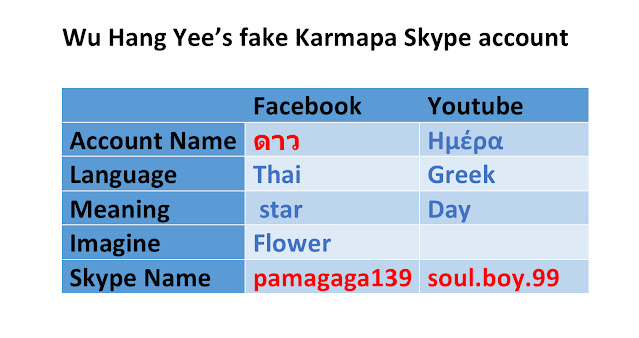














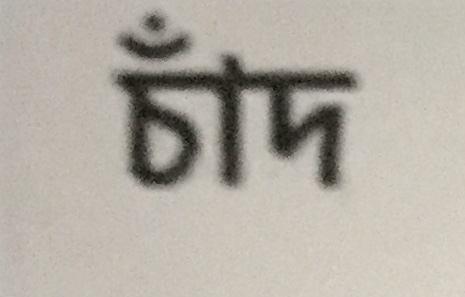



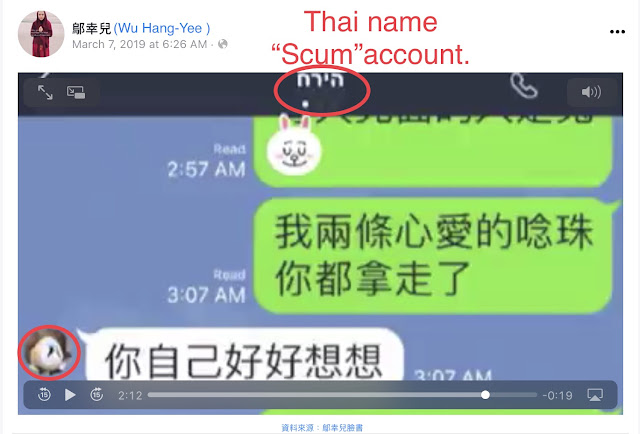
















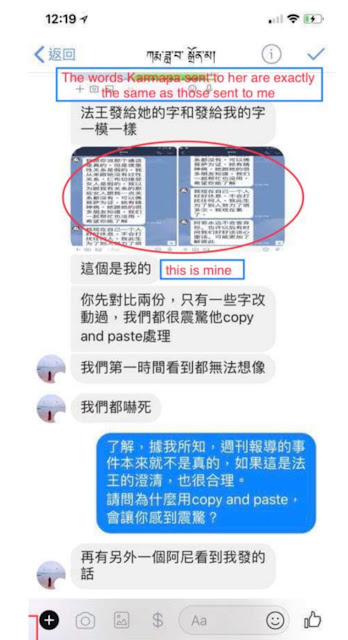


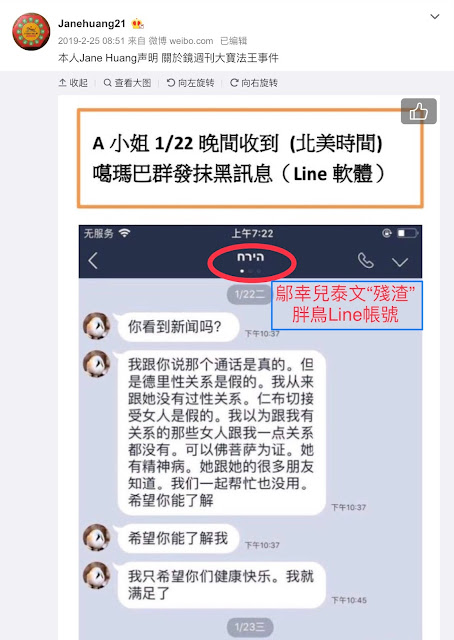





















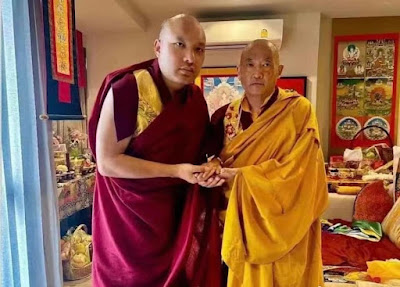

Comments
Post a Comment